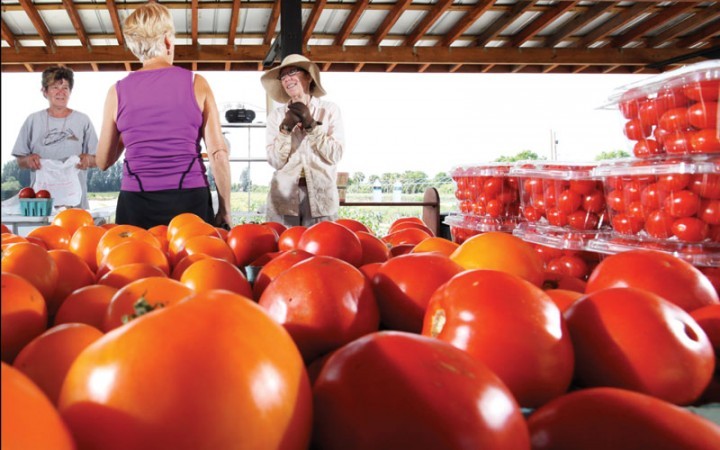
INDIAN RIVER COUNTY — Mother Nature seemed bent on Vero not eating its vegetables as weather problems two years in a row forced Veggies of Vero, a 14-acre community farm, to close for good this week. The farm delivered its fresh vegetables, herbs, melons and strawberries weekly and bi-weekly to more than 200 families.
After back-to-back freezes its first year, and back-to-back floods at the start of this season, the family-run farm announced that this last Friday’s boxes of vegetables would be the last.
Unless another farmer takes over the operation, it will not reopen next fall.
The farm ran on a model of community supported agriculture, or CSA, but for one key difference: Unlike a true CSA operation, its members were not required to pay an upfront fee to join, thereby sharing the risk in the event crops took a hit from weather or blight.
That model might have prevented the farm from going under, said Rebecca Hornbuckle, who with her husband, Mark, and her brother, Nat Rew, opened the operation in late 2010.
“It’s not that people wouldn’t have done it, I just felt it was such a new concept for the community that it would be a turn off to people,” said Rebecca Hornbuckle.
There was also a matter of what Hornbuckle called “veggie fatigue,” when bountiful crops would come in all at once.
Though she included suggestions and recipes with each box, some families were at times overwhelmed, she said.
“I would say to people who are interested in belonging to a CSA, the work doesn’t stop when the vegetables go into the box. When people in CSAs get extra, they freeze it, they can it, they pickle it. Telling people that up front would have them in a better mental place.”
Hornbuckle said price is also part of the commitment.
“We were the ant-ieconomy of scale,” she said of small, multi-varietal farming that allows crops to fully ripen in the field and then delivers them on the day they are picked. “It’s an uneconomical way to farm, so you have to make your money back in a CSA farm share.
“Anybody can grow vegetables cheaply,” she said. “But it’s like apples and oranges.”
Oranges are something about which the Hornbuckles have long known plenty. They have had a citrus production company for many years. While oranges and grapefruit also suffer from drought, cold and standing water, Veggies of Vero’s many varieties of produce took the freezes and floods in differing ways, making the success of the farm even harder to predict.
Rebecca Hornbuckle said they took pride in paying workers more than a living wage.
“They were not just farm workers, they were part of the team.” In addition to a professional farmer hired this year, the farm ran with six full-time workers.
“I still want people to be psyched about this concept. But it takes commitment on the part of the member to be able to use it in an economical fashion.”
As for Hornbuckle, “I’m exhausted.”
Veggies of Vero will continue to hold its Friday market on site, west of 58th Avenue on Fifth Street SW. It will also keep a presence at the beachside farmers market until remaining crops – corn, beans, and melons – are gone.
“The number one reason people joined was taste. The other reason was they wanted to know who was growing their food.”
Indeed, people got to know their farmers well. Tears flowed Friday as some customers hugged the farmers, grateful for their relentless effort in promoting the farm-to-table movement.



